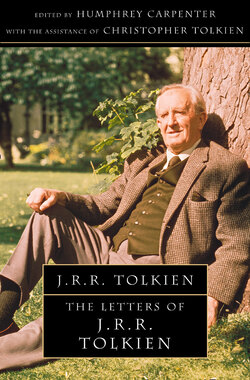Читать книгу The Letters of J. R. R. Tolkien - Christopher Tolkien - Страница 69
63 To Christopher Tolkien
Оглавление24 April 1944 (FS 19)
20 Northmoor Road, Oxford
My dearest Chris,
Your airletter. . . . arrived at breakfast this morn. I had the uncommon luxury of lying a-bed with toast and home-made marmalade (a good many oranges and lemons lately) and your letter. St George’s day passed uneventfully; I sat up ‘on duty’ till 1.30 this morn, and then decided to retire: it is so warm one can sleep with open windows and hear alerts. I was drawing my curtains when I noted a v. white light S.W., and I was just putting foot in much desired sheets when Ulysses’ Peril1 let off her wail. Did not in fact get to bed till past 3.30, or sleep till 4, or wake till 8.45, or get up till 9.45. . . . . I spent what was left of this morning in town doing odd jobs, among them that of getting my head-harvest reaped: a big crop: still fertile soil evidently. Mitre2 was locked! Have not tasted beer since Thursday last when our barrel ran dry, & has not yet been replaced. I have to lecture tomorrow, so now I must stop for the moment. . . . .
Wed. 26 April. . . . . Yesterday felt effects of Sunday night. Went off early to town and did some executor’s business for Mrs Wright,3 gave a poor lecture, saw the Lewises and C.W. (White Horse) for ½ hour; mowed three lawns, and wrote letter to John, and struggled with recalcitrant passage in ‘The Ring’. At this point I require to know how much later the moon gets up each night when nearing full, and how to stew a rabbit! No Lewis this morning, as he has been appointed Clarke Lecturer in Cambridge, and leaves early to lecture there at 5 p.m. on Wednesdays. . . . .
3.45 Wed. A record college meeting (12½ mins.)! Arrived back to find Biddy had broken another egg (about the 7th), so, despairing that the ‘henwife’ would attend to it, I have spent an agreeable time catching her (i.e. the bird), cleaning her, trimming her and disinfecting her – and then disinfecting myself. Grr! The fourth lawn will have to wait. I was pleased that you managed to get some church at the end of Holy Week, though not too pleased with your Even-christians (as they called ‘em in O. & M.E.).4 However that cannot be helped. The only salve is the sudden reflection that one of them is prob. making an adverse judgement on oneself, not unreasonable as founded on one’s looks and deportment, but as wide of the mark of the inner self as our own are! God ána wát.5 But as for sermons! They are bad, aren’t they! Most of them from any point of view. The answer to the mystery is prob. not simple; but part of it is that ‘rhetoric’ (of which preaching is a dept.) is an art, which requires (a) some native talent and (b) learning and practice. The instrument used is v. much more complex than a piano, yet most performers are in the position of a man who sits down to a piano and expects to move his audience without any knowledge of the notes at all. The art can be learned (granted some modicum of aptitude) and can then be effective, in a way, when wholly unconnected with sincerity, sanctity etc. But preaching is complicated by the fact that we expect in it not only a performance, but truth and sincerity, and also at least no word, tone, or note that suggests the possession of vices (such as hypocrisy, vanity) or defects (such as folly, ignorance) in the preacher.
Good sermons require some art, some virtue, some knowledge. Real sermons require some special grace which does not transcend art but arrives at it by instinct or ‘inspiration’; indeed the Holy Spirit seems sometimes to speak through a human mouth providing art, virtue and insight he does not himself possess: but the occasions are rare. In other times I don’t think an educated person is required to suppress the critical faculty, but it should be kept in order by a constant endeavour to apply the truth (if any), even in cliché form, to oneself exclusively! A difficult exercise. . . . .
I was much amused by your account of your journey to Jo’burg on Maundy Thursday. . . . . If you fetch up at Bloemfontein I shall wonder if the little old stone bank-house (Bank of South Africa) where I was born is still standing. And I wonder if my Father’s grave is there still. I have never done anything about it, but I believe my mother had a stone-cross put up or sent out.6 (A. R. Tolkien died 1896). If not it will be lost now, prob., unless there are any records. . . . .
